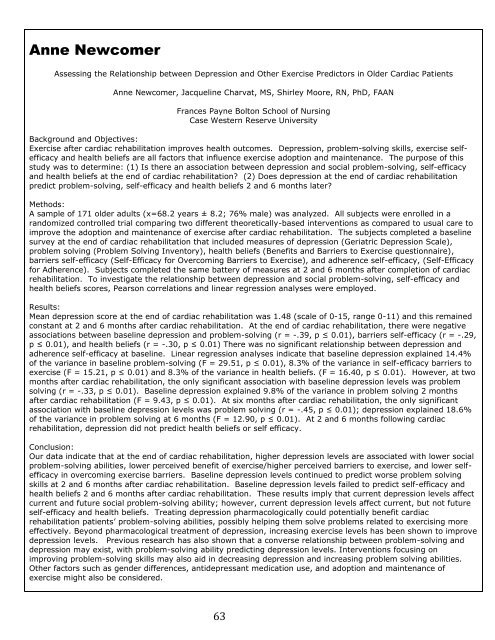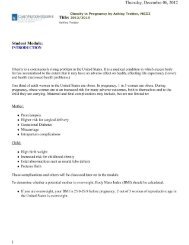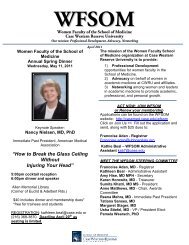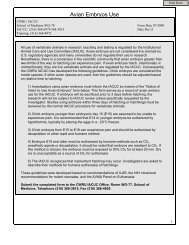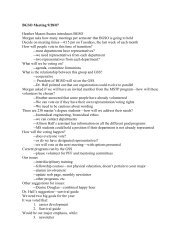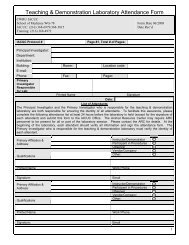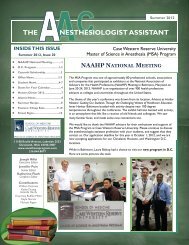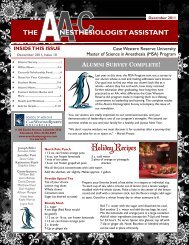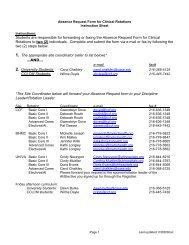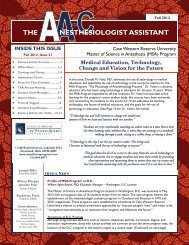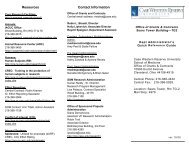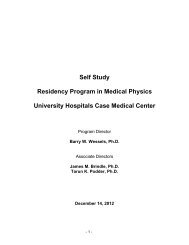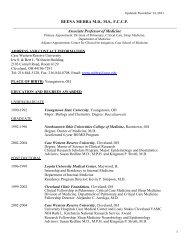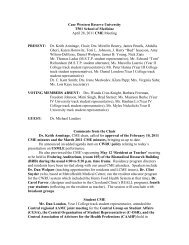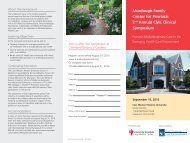student research day - Case Western Reserve University School of ...
student research day - Case Western Reserve University School of ...
student research day - Case Western Reserve University School of ...
You also want an ePaper? Increase the reach of your titles
YUMPU automatically turns print PDFs into web optimized ePapers that Google loves.
Anne Newcomer<br />
Assessing the Relationship between Depression and Other Exercise Predictors in Older Cardiac Patients<br />
Anne Newcomer, Jacqueline Charvat, MS, Shirley Moore, RN, PhD, FAAN<br />
Frances Payne Bolton <strong>School</strong> <strong>of</strong> Nursing<br />
<strong>Case</strong> <strong>Western</strong> <strong>Reserve</strong> <strong>University</strong><br />
Background and Objectives:<br />
Exercise after cardiac rehabilitation improves health outcomes. Depression, problem-solving skills, exercise selfefficacy<br />
and health beliefs are all factors that influence exercise adoption and maintenance. The purpose <strong>of</strong> this<br />
study was to determine: (1) Is there an association between depression and social problem-solving, self-efficacy<br />
and health beliefs at the end <strong>of</strong> cardiac rehabilitation? (2) Does depression at the end <strong>of</strong> cardiac rehabilitation<br />
predict problem-solving, self-efficacy and health beliefs 2 and 6 months later?<br />
Methods:<br />
A sample <strong>of</strong> 171 older adults (x=68.2 years ± 8.2; 76% male) was analyzed. All subjects were enrolled in a<br />
randomized controlled trial comparing two different theoretically-based interventions as compared to usual care to<br />
improve the adoption and maintenance <strong>of</strong> exercise after cardiac rehabilitation. The subjects completed a baseline<br />
survey at the end <strong>of</strong> cardiac rehabilitation that included measures <strong>of</strong> depression (Geriatric Depression Scale),<br />
problem solving (Problem Solving Inventory), health beliefs (Benefits and Barriers to Exercise questionnaire),<br />
barriers self-efficacy (Self-Efficacy for Overcoming Barriers to Exercise), and adherence self-efficacy, (Self-Efficacy<br />
for Adherence). Subjects completed the same battery <strong>of</strong> measures at 2 and 6 months after completion <strong>of</strong> cardiac<br />
rehabilitation. To investigate the relationship between depression and social problem-solving, self-efficacy and<br />
health beliefs scores, Pearson correlations and linear regression analyses were employed.<br />
Results:<br />
Mean depression score at the end <strong>of</strong> cardiac rehabilitation was 1.48 (scale <strong>of</strong> 0-15, range 0-11) and this remained<br />
constant at 2 and 6 months after cardiac rehabilitation. At the end <strong>of</strong> cardiac rehabilitation, there were negative<br />
associations between baseline depression and problem-solving (r = -.39, p ≤ 0.01), barriers self-efficacy (r = -.29,<br />
p ≤ 0.01), and health beliefs (r = -.30, p ≤ 0.01) There was no significant relationship between depression and<br />
adherence self-efficacy at baseline. Linear regression analyses indicate that baseline depression explained 14.4%<br />
<strong>of</strong> the variance in baseline problem-solving (F = 29.51, p ≤ 0.01), 8.3% <strong>of</strong> the variance in self-efficacy barriers to<br />
exercise (F = 15.21, p ≤ 0.01) and 8.3% <strong>of</strong> the variance in health beliefs. (F = 16.40, p ≤ 0.01). However, at two<br />
months after cardiac rehabilitation, the only significant association with baseline depression levels was problem<br />
solving (r = -.33, p ≤ 0.01). Baseline depression explained 9.8% <strong>of</strong> the variance in problem solving 2 months<br />
after cardiac rehabilitation (F = 9.43, p ≤ 0.01). At six months after cardiac rehabilitation, the only significant<br />
association with baseline depression levels was problem solving (r = -.45, p ≤ 0.01); depression explained 18.6%<br />
<strong>of</strong> the variance in problem solving at 6 months (F = 12.90, p ≤ 0.01). At 2 and 6 months following cardiac<br />
rehabilitation, depression did not predict health beliefs or self efficacy.<br />
Conclusion:<br />
Our data indicate that at the end <strong>of</strong> cardiac rehabilitation, higher depression levels are associated with lower social<br />
problem-solving abilities, lower perceived benefit <strong>of</strong> exercise/higher perceived barriers to exercise, and lower selfefficacy<br />
in overcoming exercise barriers. Baseline depression levels continued to predict worse problem solving<br />
skills at 2 and 6 months after cardiac rehabilitation. Baseline depression levels failed to predict self-efficacy and<br />
health beliefs 2 and 6 months after cardiac rehabilitation. These results imply that current depression levels affect<br />
current and future social problem-solving ability; however, current depression levels affect current, but not future<br />
self-efficacy and health beliefs. Treating depression pharmacologically could potentially benefit cardiac<br />
rehabilitation patients’ problem-solving abilities, possibly helping them solve problems related to exercising more<br />
effectively. Beyond pharmacological treatment <strong>of</strong> depression, increasing exercise levels has been shown to improve<br />
depression levels. Previous <strong>research</strong> has also shown that a converse relationship between problem-solving and<br />
depression may exist, with problem-solving ability predicting depression levels. Interventions focusing on<br />
improving problem-solving skills may also aid in decreasing depression and increasing problem solving abilities.<br />
Other factors such as gender differences, antidepressant medication use, and adoption and maintenance <strong>of</strong><br />
exercise might also be considered.<br />
63


